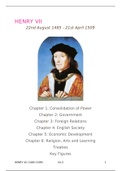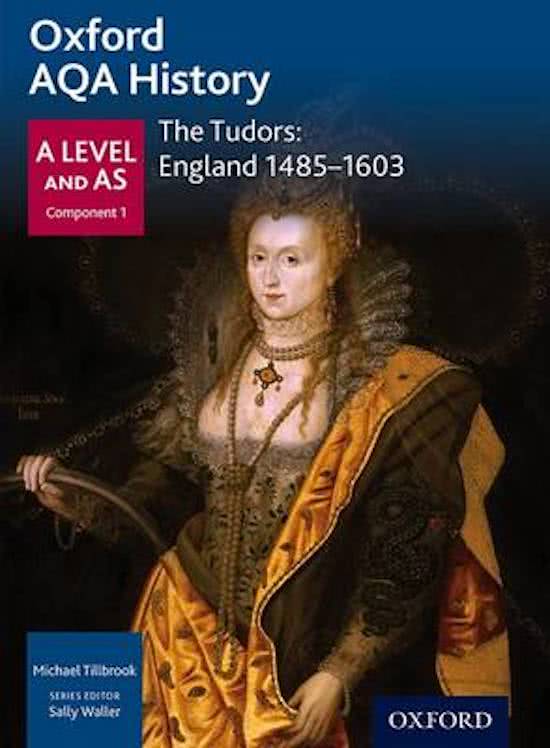HENRY VII
22nd August 1485 - 21st April 1509
Chapter 1: Consolidation of Power
Chapter 2: Government
Chapter 3: Foreign Relations
Chapter 4: English Society
Chapter 5: Economic Development
Chapter 6: Religion, Arts and Learning
Treaties
Key Figures
HENRY VII (1485-1509) V4.3 1
,CONSOLIDATION OF POWER
KEY QUESTIONS
• How effectively did the Tudors restore and develop the powers of
the monarchy?
• How important were the roles of key individuals and groups and
how were they affected by developments?
• How secure was the Tudor dynasty by 1509?
• What was the main factor in Henry’s consolidation of power?
• What was the main threat to Henry’s new government?
HOW DID HE CONSOLIDATE HIS POWER?
PARLIAMENT
Henry dated his reign from 21st August 1485, this allowed him to declare
anyone who had fought as a Yorkist at the Battle of Bosworth as a traitor. He then
passed Parliamentary Acts of Attainder, this would mean their property was forfeited
to the crown and ensured royal income. This was further enhanced when Parliament
granted Henry tonnage and poundage for life (further cementing his status as the
monarch). In 1486, Parliament also passed the Act of Resumption, this recovered for
the crown, any property that had been granted away since 1455.
PERSONAL STRENGTHS
Henry VII was an incredibly manipulative and cunning monarch. He carefully
dealt with the other claimants to the throne as well as manipulating the timing of his
and the orchestration of his marriage to Elizabeth of York. Elizabeth of York was
detained in 1485 and on 18th January 1486, Henry married Elizabeth. By leaving this
until last in terms of coronation, Henry cleverly made it appear as if the assumption
of power was not brought about by his wife.
Henry also created a line of succession through the birth of Prince Arthur on
20th September 1486 which allowed him to further consolidate his power.
REWARDING SUPPORTERS
Henry publicly rewarded key supporters and conferred 11 knighthoods. He
also made key appointments to his household for example, he appointed Reginald
Bray Chancellor of the Duchy of Lancaster and Sir William Stanley Chamberlain of
the Household.
HENRY VII (1485-1509) V4.3 2
, He also arranged for his supporters to detain Elizabeth of York and the Earl of
Warwick (Edward IV’s nephew) - each of whom had a much stronger claim than
himself).
PRETENDERS
PERKIN WARBECK
Perkin Warbeck claimed to be Richard, Duke of York. In 1492, Margaret of Burgundy
recognized him as her nephew. Margaret of Burgundy was Richard III’s sister. This would
have given him legitimacy and a claim to the throne. His claim was further granted legitimacy
when in 1494, Maximillian I recognized him as Richard IV. However, he did not have the
funds to finance an invasion. This didn’t stop Warbeck and in 1495, he attempted to invade
England for the first time. This invasion failed and he fled to James IV’s court in Scotland
where he was granted an annual pension of £1200. Warbeck tried to capitalize on the
Cornish Rebellion in 1497 and was arrested after he failed to gain support. He was executed
in 1499 after he attempted to escape. Warbeck gained support in England from Sir William
Stanley – Lord Chamberlain and head of the Royal Household. Stanley was executed in
1495 for his involvement.
LAMBERT SIMNALL
Simnall first impersonated Richard, Duke of York; he then went on to impersonate
the Earl of Warwick. In May 1487, he was crowned Edward VI in Dublin. However, Henry VII
had the real Earl of Warwick locked in the tower of London and was able to show Simnall
was a fraud. This led to the Battle of Stoke Field on 16th June 1487. Henry had 12,000
soldiers whilst the Earl of Lincoln had 8000 – 2000 of whom were sent by Margaret of
Burgundy. As a result of this, 28 nobles who had rebelled were attainted and their lands
confiscated.
HENRY VII (1485-1509) V4.3 3
,HENRY VII’S GOVERNMENT
KEY QUESTIONS
• In what ways and how effectively was England governed during
this period?
• How important was the role of key individuals and groups?
COUNCILS AND THE COURT
THE COUNCIL
The Council had 3 main functions: to advise the king, to administer the realm on the
King’s behalf and to make legal judgements. Around 227 men are recorded to have attended
during his reign, however, the working council was only around 6-7 members. There were no
established rules or procedures.
THE COUNCIL LEARNED
This was an offshoot of the main council that controlled the nobility through bonds
and recognizances. They maintained the king’s revenue and exploited prerogative rights.
Following Richard Bray’s death in 1503, the council was ruled by Richard Empson and
Edmund Dudley. The Council Learned largely operated through bonds and recognizances.
Both indebted the noble to the Crown, many were purely politically motivated.
COURT AND HOUSEHOLD
Court was the center of government. There were different levels to the court. The
Household proper looked after the king, courtiers and guests. The Chamber was the
politically important part of the household and was presided over by the Lord Chamberlain.
STAR CHAMBER
The Court of the Star Chamber was used to break the power of the landed gentry. It
showed he was strong and capable of creating a stable government through his enforcement
of the law.
PARLIAMENT
Henry called parliament 7 times in his reign – 5 in the first 10 years. The first time he
called parliament was in November 1485 to show his right to rule. Early meetings were about
national security and raising revenue, others granted extraordinary revenue in order to wage
a war. Parliament passed Acts of attainder but was largely called when Henry VII needed
money.
JUSTICES OF THE PEACE
These were landowners or nobles who were controlled by bonds and recognizances. Their
job was to maintain law and order in the countryside by conducting trials and granting bail.
HENRY VII (1485-1509) V4.3 4
, Henry VII relied on local officials to detain people and granted acts in parliament to increase
their power. They were elected every 4 years.
IRISH COUNCIL
The Irish Council had limited control outside Dublin and so Henry had to rely on nobles. After
passing Ponying’s Law, no laws could be passed in Ireland without Henry VII’s approval.
FINANCES
On his death, Henry VII left plate and jewels worth around £300,000 and around £10,000 in
cash.
CROWN LANDS
The largest source of income for Henry VII was crown lands. In 1495, an act of parliament
conferred all of Richard III’s land to Henry VII, making Henry England’s largest landowner. At
the beginning of his reign Henry earned £3000 a year from crown lands, by the end this had
increased to £42,000 a year. This was in part, due to Sir Thomas Lovell and Sit John Heron.
FEUDAL DUES
As king, Henry was entitled to marriage dues, relief, livery, wardship and escheats. Feudal
dues mostly concerned land – escheats were payments made when land reverted to the
crown, livery was a fine paid to recover land from wardship and relief was money paid to the
crown when land was inherited. In 1504, Parliament granted feudal aid which increased
Henry’s revenue.
OTHER SOURCES OF REVENUE
Customs Revenue: During the first Parliament meeting, Henry was granted the right
to tonnage and poundage for life. This rose from £34,000 to £38,000 during his reign.
Pensions: In the 1492 Treaty of Etaples, France agreed to pay £5000 a year.
Profits of Justice: This included fines and bonds so some of the revenue only
represented a potential. £200,000 was promised from 1504 to 1507.
Extraordinary Revenue: Over £400,000 was raised from extraordinary taxation,
however, this was a factor in rebellions in 1489 and 1487. In 1504, Henry was barred
from raising money this way anymore.
HENRY VII (1485-1509) V4.3 5





